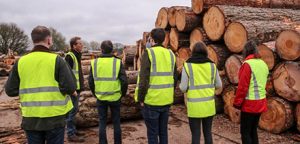The UK’s Timber Trade Federation (TTF) said that on the ground the impact of COVID-19 might seem evident, it is only in the last few days that official figures have been revealed. TimberTrends has provided a provisional analysis of timber imports, which shows an overall 30-35% drop in import volumes in April 2020 as compared with April 2019. Source: Timberbiz
Across individual product categories this reduction varies significantly. Products with healthy local domestic production saw imports drop most significantly, as could be expected, with particleboard falling by 60-70%, MDF by 50-60%, and OSB by 40-50%.
On the other hand, hardwood and hardwood plywood dropped by between 40-45%, and softwood, which is by far the largest import category for timber in the UK, saw 30-35% reduction in volume.
The only product category in which import volumes in April 2020 were shown not to be affected was softwood plywood. However, this category was buoyed by the coniferous plywood quota. Were this not the case, a 40% fall in softwood plywood imports would have been the likely result.
While Government schemes have been sustaining businesses and preventing redundancies, Travis Perkins this week announced they were set to shed 2500 jobs in the UK. This represents a 10th of its workforce, and the closure of around 165 stores. Likely, they will not be the last to downscale parts of their business in the face of challenged demand, but much remains up in the air as construction adjusts to social distancing, and economic stimulus measures, such as £100bn in bond buy backs by the Bank of England.
Falls in timber import volumes were mirrored in the Building Merchants Building Index, which showed value sales in April 2020 down 76.3% compared with April 2019.
Despite drops in imports and sales, surveys and reports with TTF members continued to show that timber stocks are more than sufficient to meet demand. There are pockets of shortages, and longer lead times on certain products, such as decking, fencing and garden products – a category which saw unprecedented demand when the furlough scheme kicked in alongside good weather- but the level of supply for commercial construction remains healthy.
The construction industry can be assured that ultimately the timber supply chain is sufficiently diverse and flexible to meet the demands of the market. As demand comes back more evenly across the economy, supply will balance out to meet it.






